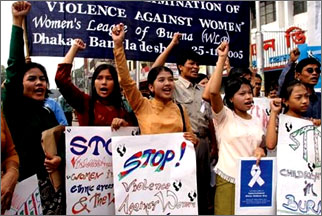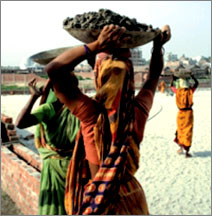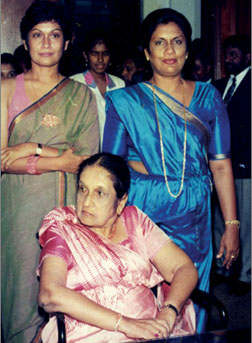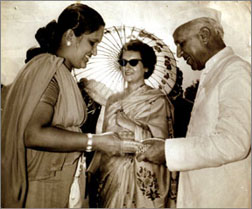|
International Women's Day falls on March 8 :
Duty versus personal freedom
In the context of defining women's role :
by Ranga Chandrarathne
|

Slogans: Abolish
violence and save the next generation |

Nourishing humanity
|
As Asia steps up into the new millennium, the conventional role
allotted to the woman as a mother, obedient wife, widow, house manager,
rearing and bearing of children has been changing with the emergence of
the new economic and social order.
Universal education, gender equality in employment though to a
certain degree, has empowered women and changed the societal stance that
woman should be confined to the backyard managing the household and
bearing and rearing children.
However, the traditional perception of a girl-child, by and large,
remains intact among certain communities where the parents' dearth of
education or deep-seated social myths, severely affected the behaviour
of the girl child and perhaps, determined her fate.
Certain set-behaviours, social practices such as 'coming of the age'
which is a natural biological phenomenon, has still been practised even
by the so-called 'educated' parents.

Mother of the Nation with the two daughters Sunethra and Chandrika
who contributed much for the women folk. |

Founder of the Society of lady Prime Ministers with her next
compound successor |
In Sri Lanka, though genital-mutilation or circumcision has not been
practised, mythical practices such as chastity-test on the honeymoon-bed
which has absolutely no scientific basis, has been continuing in the
name of culture. The adherents of those practices are the opinionated
persons with misguided political philosophies.
The first step that Sri Lankan women should take before stepping into
the new millennium as liberated women is to stretch the artificial
limitations that have been imposed upon them by the society. These
practices are often taken for granted and if challenged, such attempts
were nipped in the bud citing them as un-cultural or alien to Sri Lankan
culture.
For instance, the sex life of an average Sri Lankan girl is often
dictated by the male which is perceived as a social norm inhibiting sex
education at school level, leading teenage girls to rely on the
secondary sources of information such as peer-groups and cheap thrash.
A 'good girl 'according to Sri Lankan traditional norm is a girl
child who had been carted from her very childhood to the marriage and
who hasn't had a boy-friend. Often career prospects and personal
progress of a girl child is sacrificed on the sanctified altar of
marriage.
The institution of marriage, though it underwent serious
transformations over the years, has been confronted with new challenges,
such as rising divorce rates and liberated women who do not want to tie
the nuptial knot, emerging life-styles such as 'living together' and
pre-marital sex.
The fact that the obsolete moralists and cultural puritans, have been
wilfully ignored is that the healthy marriage is, by and large,
determined by the mutual understanding of the couple and their coping
abilities rather than other factors such as parental consent.
Though 'living together' is practised among the higher echelons of
the social strata, it has not been trickled down to the mainstream
society and generally perceived as 'abnormal' or alien to Sri Lankan
culture.
Societal attitude to single-women as an easy-prey has not been
changed dramatically. It has been noted that even several upper middle
class single-women were unsolicitedly approached by salacious men who
have erroneously taken those women for women of easy virtue.
Professional prejudice towards working women and unequal gender
representation in parliament and other provincial governing structures
are some of the challenges that not only women have to confront with,
but are also social malevolence that the entire society has to overcome.
Benazir Bhutto, Sheik Hasina, Indira Gandhi, Sonia Gandhi, Sirimavo
Bandaranaike, Chandrika Bandaranaike Kumaratunga and Srimani
Athulathmudali were the victims of gender prejudice when they entered
into mainstream politics.
The case in point in this regard is the former President Chandrika
Bandaranaike Kumaratunga. When she was in power, she was subjected to
venomous attacks by her political opponents not on her weaknesses in
governance but on capitalizing her gender.
Perhaps, she is the most- attacked politician mainly because of the
jealousy of her impressive academic background nourished by new ideas
and her being privileged to be educated at a European university at a
time radical changes swept over the student life extensively.
It is pity that a country which produced the world's first woman
Prime Minister, even after decades, of archetype beliefs on women and
ingrained prejudices remain and sometimes re-enforced by certain
sections of the society to achieve political and social mileage.
It is a tragedy that some of the deeply rooted ideas and chauvinism
had taken the upper hand in protesting when Sonia Gandhi's name was
proposed for premiership. The most pathetic scene was that the women
campaigners were in the forefront of the protest aimed at depriving
another woman of her political rights even though millions of Indians
rallied behind Sonia Gandhi and her party. Sonia had overwhelmingly won
the constituency she contested for.
Recent harassments meted out to Sri Lankan woman film maker after
Sumithra Peries, Enoka Satyangani Keerthinanda is a fine example of
professional jealousy and limited social space for liberated women.
Her award winning creation, Sulang Kirilli (The Wind Bird) which had
the privilege of representing the competitive section of the prestigious
Tokyo international film festival, was lethally attacked by
pseudo-moralists, half-baked critics and film makers.
A film maker has made a malicious comment on the film comparing its
background music to a beating on an iron sheet. Society should seriously
address the issues of sexual harassment of women in public as well as
exploiting them at places of work.
Sexual harassment of women in over crowded buses and trains is also a
common occurrence in the metropolis. Though a sticker was pasted on
public transport, subtle forms of molestations continue unabated, a fact
often taken for granted.
Grouping in public transport has become a phenomenon and this has
recently extended to mushrooming three-wheelers. An unmarried medical
officer was approached by a three-wheeler driver who thought that she
would be an easy prey.
She says that upper middle class women are freed from the mind-forged
manacles of customs and tradition imposed restrictions. However, she has
gone into a society, which still believes, on a set-role for women.
Sri Lankan mothers-in-law are still demanding dowry from her
would-be-daughters-in-law. This has placed undue importance on the
material and monetary gains virtually undermining the fundamentals of
marriage; matching personality, the understanding.
A dental therapist mother-in-law, who offers flowering tributes,
every morning and evening to Buddha, demanded an exuberant sum of one
million rupees as dowry and the father of the daughter-in-law to be had
to retire and contribute the entire provident fund to settle the
pre-marriage dispute.
The customary wedding cake and necklace which should have been
offered by the engineer bridegroom had also to be financed by the family
of the would-be-bride. The most hilarious part was that the 'home coming
'was also held at a hotel spending more than Rs. 250000 from the dowry.
However, their mother-in-law started to harass her daughter-in-law
demanding a wooden almirah despite the one million cash, a house and
jewellery. This was an attempt of the mother-in-law selling the degree
certificate of her son to gain quick-money to lead a life of luxury at
the expense of the daughter-in-law's goodwill.
Although we could not reform fossilizing mothers-in-law, we could, at
least, educate the next generation to respect women's dignity. This
behaviour on the part of the three-wheeler driver was born out of
prototype beliefs entertained by the lower strata of the society that
each and every single-woman can be approached and would be easy preys
for them.
In another instance, a mother-in-law demanded of her son the time,
manner and the days that her daughter-in-law should have sex following
the abortion of the first child.
The tragedy of all these instances is that the mothers-in-law and
members of the families were professionals. This is a serious lapse in
education which has only imparted knowledge maintaining the age-old
obsolete ideas and misconceptions in the name of culture.
Although women all over the world converge in unison to dramatise the
shameful condition of their being separated, isolated, deprived of their
rights and more or less the denial of their lives in the name of
culture; their rights are still written an unrealized promissory note.
Continuous agitation coupled with a process of education should be
launched to stamp out social prejudices and improve the condition of
women in general and working women in particular.
Women should ponder on alternative ways and means in changing social
attitudes with the intention of winning over personal freedom and rights
overcoming some of the socially-imposed duties rather than merely
protesting annually when world marks the International Women's Day.
[email protected] |
